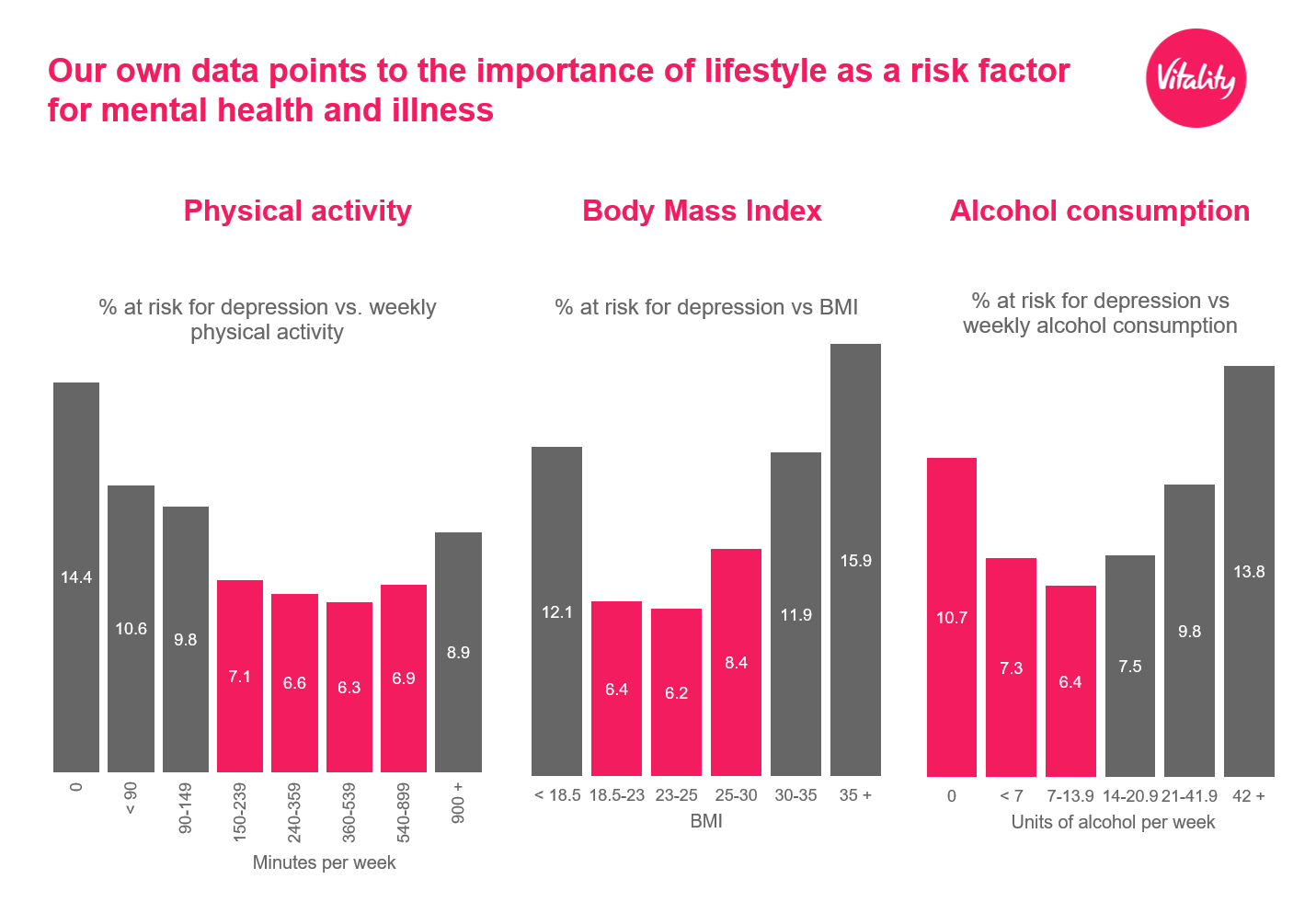Why client mental and physical health should not be viewed in isolation
Vitality data shows individuals doing no physical activity are more than twice as likely to report
symptoms of depression.
With mental health in focus more so now than ever before, a significant amount of research exists to
demonstrate the relationships between physical and psychological wellbeing.
Our Britain’s Healthiest Workplace data, for example, points to a significant correlation between individuals’ risk of depression, and their level of weekly physical activity.
Individuals doing no physical activity were more than twice as likely to report symptoms of depression, when compared to those doing two hours or more per week.
Ahead of his appearance on the Vitality Speaker Series in April neuroscientist and nutrition expert Matt Janes agrees. “People instinctively know that the mind and body are connected, hence common phrases such as ‘gut feeling’, but the science isn't widely understood.”
The mind, brain and body are connected via the autonomic nervous system, the regulation of which is paramount for achieving both mental and physical health, he explains.
Preventative interventions can therefore have a direct effect upon the autonomic nervous system. “You can use exercise, meditation and nutrition to 'reflex tune' this system back into balance, and when this state is achieved, mental health is restored. If people knew about the role of the autonomic nervous system in mental health, and how to manipulate it, many of today's mental illnesses could be avoided.”
Here comes the science…
As Dr Klintworth points out, medical studies1 show that doing exercise is linked to increases in brain derived neurotrophic factor (BDNF), which reduces depression risk by 17%, as well as the lowering of cytokines levels. “The benefit of exercise is not restricted to improving mental health, but also reducing the diseases to which mental illness is correlated with, such as coronary artery disease. Anxiety and depression increase cytokines which are associated with increased platelet stickiness causing platelet aggregation with accelerated atherosclerosis with clots and blockage of vessels.”Ultimately, positive wellbeing is about achieving balance across a range of areas that include improved physical health, through physical activity, healthy eating (that includes a balanced alcohol intake) and healthy sleep patterns. “This does improve risks associated with chronic conditions, drives improvement to mental health and ultimately improves the duration of unhealthy life years.”
 Source: Britain's Healthiest Workplace 2019, 25,337 respondents
Source: Britain's Healthiest Workplace 2019, 25,337 respondentsA positively different approach
The World Health Organisation (WHO) estimates that over 300 million people worldwide suffer from some form of mental health condition2 , which can vary dramatically, from more common issues such as anxiety and stress to more severe conditions, such as depression, schizophrenia or bi-polar disorder. These different conditions have dramatically different impacts on individuals and naturally require different treatment approaches.Healthcare providers have traditionally focused on the treatment of acute ill-health when it arises. While it is crucially important to provide this treatment, there is a risk that such an approach fails to cater for a broader group of the population who may face mental health and wellbeing issues which are not severe enough to fall within its scope.
While tackling a range of interrelated behaviours might seem like a challenge on one hand, it also opens possibilities with regards to improving an individual’s overall wellbeing through a comprehensive and structured approach. Evidence from Vitality’s member base over time indicates that those engaging with Vitality are significantly more likely to improve a range of risk factors, including physical activity and mental wellbeing risk.
Why does this matter to financial advisers?
Protection adviser Matthew Chapman tells us about the conversations he is having about the connections between mental and physical health...
Is this something you talk about and are clients interested?
“Given that mental health is an extremely important topic for so many, it is often at the forefront of our discussions with clients and a matter of great interest. Whether we are talking about financial protection in the event of a deterioration in their mental health or mechanisms to help the client to make healthier lifestyle choices, these are definitely topical and valued considerations for a large number of our clients.”Does talking about the Vitality proposition help encourage clients to commit to improving their overall physical health and wellbeing?
“Many clients already understand the correlation between exercise and improved mental and physical wellbeing, therefore to be able to introduce a product that both rewards and encourages healthier lifestyle choices is a real positive. Clients often want to make positive changes already and simply need a tangible incentive to be able to do so. The Vitality proposition offers advisers a way to add fundamental value to their recommendations and deliver solutions to clients that meet a combination of personal financial protection needs coupled with support to help them take the necessary action to improve their lifestyle, health and wellbeing too.”What tends to work and what doesn’t when discussing the Vitality proposition with clients?
“Clients are almost always most interested in the rewards that are available to them as they see this as a way of potentially offsetting the cost of their protection insurances. However, we often position it more as a win, win, win. It benefits the client as they get the essential cover they need yet are motivated to make healthier lifestyle choices, which in turn benefits the insurer who is less likely to experience claims from their policyholders given the correlation between healthier clients and propensity to claim, and it benefits us as advisers because we have clients who are more engaged with their insurances and less likely to simply cancel this essential cover down the line. Clients are often receptive to this because the logic is undeniable.”Mental health cover and support
VitalityHealth’s approach to mental health is designed to respond to the broad and varied nature of mental health issues affecting people. This includes tools and incentives to promote better physical and mental wellbeing; early intervention and Talking Therapies support; and more comprehensive in-patient, day-patient and out-patient treatment for severe conditions.Within these broader categories, individuals' treatment is also highly personalised - based on a clinically led triage assessment which considers their condition and circumstances. All of this provides an end-to-end approach to mental health and wellbeing which caters for individuals at all levels of risk.
Find out more about how VitalityHealth can support the mental health and wellbeing of your clients.
Sources:
1. Harvard Medical School publication 2009
2. World Health Organisation, March 2018
Where to next?
-
Behavioural science and the road to healthier living
Why promoting better lifestyle choices can help save lives.
-
Menopause and mental health
Considering the majority of women go through the menopause, most of them at work, the time has come for us all to stop avoiding the conversation.
-
Insights Hub
Our Insights Hub brings you our range of adviser content - from video series to articles & blogs.


